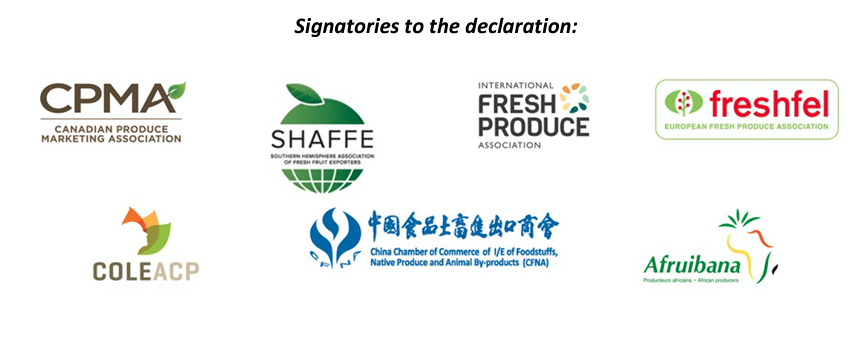DECLARATION
The global fresh produce industries unite in a call to national and regional public authorities and multilateral bodies, such as WTO, FAO, UNCTAD, OECD and others, to respond with urgency to the current significant hikes of costs for logistics, inputs such as fertilizers, packaging materials and energy, and an overall shortage of labour which is jeopardizing the economic viability of the fresh produce industry globally.
With a total production of 1.6 billion T (2019)1, the sector estimates that round about 50% of fresh produce is consumed locally and 50% is destined to trade. Global trade of fruits and vegetables amounted to a market value of 220 billion USD in 2020.2 With more than 200 origins and 200 destinations, the global produce industry is a sector which operates with high fragmentation, the entire range of small-, medium- and large-scale producers and a complex domestic and global supply chain, to maintain food safety and quality of its products.
While the sector demonstrated its resilience during the past two years of the COVID pandemic, the current global supply chain challenges have been leading to cascading negative effects for all parts of the industry. The sector has experienced increased costs in multiple areas including: 150 – 400% in container prices, 20% in truck transportation up to 80% in airfreight, up to 100% in, up to 100% in fertilizer costs and up to 100% in wood pallets prices.
Regionally, the economic burden of shipping logistics can be summarized as follows:
Southern Hemisphere producers estimate an increase of costs by 3.8 billion USD through the increase of container prices by round about 150% for 2022.
European growers and traders estimate a total increase of costs by 10 billion € for 2022 cumulated by all challenges along the supply chain plus 4 billion € for additional logistical costs (domestic, intra-EU, export, import)
The North American fresh produce industry reports that container prices have been climbing up as high as 25,000 USD, a massive increase over pre-pandemic costs of around 3,000 USD
More than 86 % of ColeACP members are concerned that their economic viability is impacted by the current logistic disruptions and more than 70% are considering the implementation of business changes
Considering the above, the Global Coalition for Fresh Produce urges key stakeholders and public authorities to undertake urgent solutions to stabilize the sector in a period of crisis.
For this purpose, we have identified potential mechanisms to preserve the short-term economic viability and sustainability of the sector including the following concrete proposals:
Increase attention and recognition of fruits and vegetables as a “strategic good” that have a significant contribution to long-term sustainability of the planet and public health policies.
Create stabilization mechanisms to improve accessibility of fresh produce, to ensure that fruits and vegetables can be continued to be available to everyone.
Balance the distorted sea freight environment that has seen significant changes, with carriers setting record rates and profits through the vertical integration of major shipping lines which have strengthened their control of existing supply chains.
Introduce transport subsidies for fruit and vegetable growers and exporters aimed at alleviating the immediate impact of inflated price distortions in the sea freight market.
Promote a global zero-VAT strategy for fruits and vegetables that would directly benefit producers, exporters, and consumers.
Facilitate improved access to key export markets without undermining the existing mechanisms in place to protect developing country exports.
Avoid aggressive promotional price discounts made available to end consumers that undermine the value of fresh produce and ultimately reduce already stretched margins for growers and exporters.
Strengthen public promotional investment aimed at increasing the recognition and ultimately consumption of fresh fruits and vegetables during the Southern Hemisphere counter season.
The Global Coalition of Fresh Produce is committed to continuing work on sector-based solutions – both together as well as in its respective regional contexts. However, these complex issues with their dramatic consequences can only be tackled by public-private collaboration, in which we are aiming to be a constructive and proactive partner.


